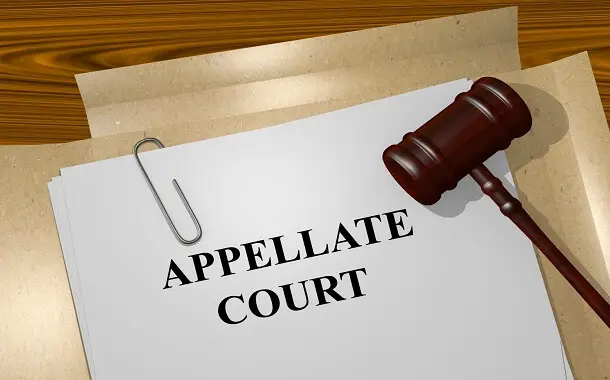How Much Does an Appeal Cost?
Last Updated on February 21, 2024
Written by CPA Alec Pow | Content Reviewed by ![]() CFA Alexander Popinker
CFA Alexander Popinker
The appeal is one of the means of attack that gives litigants the opportunity to correct the errors committed by the courts. They give you the opportunity to correct the mistakes made by the lower courts, by bringing them to the attention of the higher courts, which exercise control over the legality and validity of the decision you are contesting.
How Much Does an Appeal Cost?
There is no such thing as an “average” appeal, but a litigant should be prepared to pay less than $11,000 for a limited number of simple issues. The fees would be anywhere between $16,000 and $32,000 for more complex cases.
The litigant is not responsible only for the attorney’s fees, but also for the fees and costs of an appeal. In general, these costs are limited to the preparation of the record, transcription services, and filing fees. Usually, the most expensive are the transcription costs, which can be around $2,200 for a full day of hearings.
It is recommended to consult an appellate attorney to get a more accurate estimate for the cost of your appeal. Depending on the nature of your case, and in exchange of a small fee, an appellate attorney will be also able to make an analysis of your case so you can see if there are appealable problems.
What is included in an estimate of appellate court costs?
An appellate attorney will take an estimated guess on how much time they need for each of these processes: oral argument, preparation, research and writing, and motions when they estimate the cost of your appeal.
Usually, an attorney will need some information about the trial-level litigation, in order to offer an informed estimate. For instance: how long the trial lasted, how long the case was in court, whether motions for summary judgment or dismissal were filed, and the number of parties involved.
In general, the appellate attorney will want to review the rulings and the docket to be appealed. Also, they may want to ask what certain errors your trial attorney or you believe have appeared.
Why are the criminal appeals so expensive?
Similar to a trial, an appeal costs this much because it involves a large amount of work. However, unlike at a trial, most of this work involves writing and research. You should know how an appellate attorney spends his/her time, in order to understand what is included in the cost of an appeal.
Preparing the appeal
Usually, only a small amount of time is spent on getting the case to the appellate court. But timing is extremely important because you may lose your only chance to appeal your case if this is not done within the strict jurisdictional deadline and correctly. The moment you believe you need to appeal, you must contact an appellate attorney.
The preparation work for a criminal appeal includes ordering the transcripts from the court reporting company, ordering the record from the trial court, and filling the notice of appeal. You should be prepared to pay much more for preparing the appeal and other fees if there is a more complex or lengthier case.
Appellate briefs
An appellate lawyer spends most of their time writing briefs and researching. As you probably know, the aim of an appeal is to argue to a higher court that the lower courts made a mistake. That argument is made in the appellate brief.
You might also like our articles on the cost of suing someone, getting off probation early, or hiring a juvenile crime attorney.
The process of writing a brief is time-intensive and complex. The first thing an attorney will do is to carefully read and examine every detail of the entire record and transcripts. At this moment, the appellate lawyer is looking for possible mistakes.
The appellate record includes most, but not all, depositions filled during the trial, the pleadings, evidence, motions, and briefs. Transcripts have to be ordered for any hearing raised in an adverse outcome. The only evidence a court of appeals will consider is these fillings, which include the transcripts and the record. This first stage can take many days of work.
In the second phase, after possible errors have been identified, the appellate lawyer will determine which of them will make the strongest argument for reversal. The appeals process is complex and aims to determine:
- if error pursuing is a good strategic choice;
- which of the possible errors were actual errors;
- if the law supports reversal;
- if the actual errors were harmful, if they changed the outcome of the court proceedings;
- if the errors were preserved, meaning they were presented to the trial court’s attention.
 During the research work, your appellate attorney may find out that some problems that appeared like errors were not in fact errors, while others that seemed to be fine were actually prejudicial and erroneous. Also, this second step involves many days of work.
During the research work, your appellate attorney may find out that some problems that appeared like errors were not in fact errors, while others that seemed to be fine were actually prejudicial and erroneous. Also, this second step involves many days of work.
In the third phase, after the attorney has decided which issued to pursue, they begin the hard part. The appellate attorney will gather as much legal precedent to sustain your claims as possible, then organize and write the arguments into a compelling summary. This summary is where your attorney presents your case to the appellate court. This explains why the reversal is required and presents in detail how the established law has been violated by the trial court’s errors.
An appellate brief that is well-crafted should be as clear and concise as possible, logically organized, and compelling. This should contain the facts, law, and errors in the most favorable light for your case. Also, it should anticipate the possible defenses and good means to confront them. In the end, it should have an easy-to-follow train of logic that leads to the conclusion that the reversal is necessary.
This third phase may take days to weeks of work, depending on how complex your case is.
Appellate motions practice
Although some appeals will include responding and filing appellate motions, there are generally fewer motions than at trial. Actually, motions are actively discouraged by the appellate courts.
Rarely, if ever, appellate motions are decided on hearings. On the other hand, the appellate court will convene a panel to rule on the motions. The court will take into consideration only the arguments presented in the petition, attachments, and response.
Oral argument
When granted and requested, the appellate counsel’s final stage is the oral argument in front of a panel of judges. In general, each side gets around twenty minutes to present its case. As there is no presentation of evidence or testimony, this is not a traditional hearing.
The oral argument itself takes only a few minutes, but your appellate attorney spends many hours studying your case and preparing their presentation. They should be ready to answer any questions on any aspect of the case, that comes from the panel of judges.
What type of payments do appellate attorneys take?
Similar to most attorneys, appellate attorneys can take a lot of different types of payments. These days, debit and credit card payments have become standard, while checks and cash are less common.
How is an appeal billed?
Typically, appellate attorneys will provide you two billing options at most, after they offer you an estimate. You can be charged by the hour, and in this case, the appellate attorney will keep track of time spent working on your case. Usually, in order to represent your case, an attorney will ask for a large fee deposit in advance, placed in trust.
Also, an attorney may charge a flat fee, which is often provided at a slight discount. You can pay this fee in monthly installments with a down payment or all at once.
How can I afford my appeal?
You should treat an appeal like any other type of major investment or purchase. Before deciding whether, and how you want to proceed, you should carefully consider your options. If they have enough information, appellate attorneys will be able to advise you if it is worth the cost to pursue your appeal.
You can choose between many options to help pay for your appeal, depending on the billing method agreed to. You can pay your appeals using personal loans, which tend to have lower interest rates than credit cards, installment plans, credit cards, or fundraising.


Leave a Reply
Want to join the discussion?Feel free to contribute!